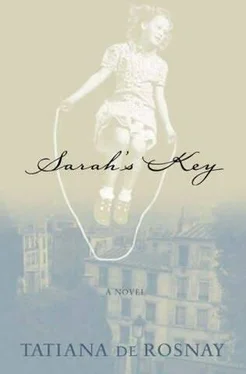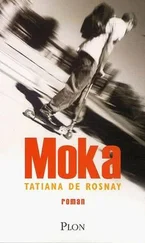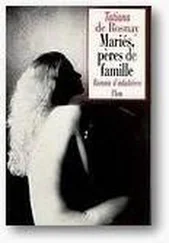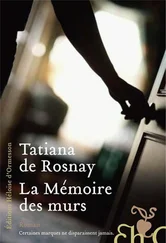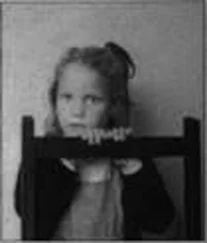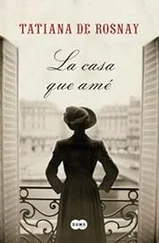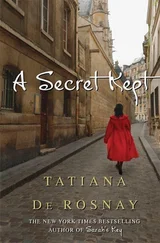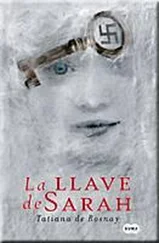“Your brother?” said the boy, slowly. “There is no Michel here.”
She pushed him aside brutally, hardly noticing the new paintings on the entrance wall, an unknown bookshelf, a strange red and green carpet. The astonished boy shouted, but she did not stop, she rushed down the long familiar corridor and turned left, into her bedroom. She did not notice the new wallpaper, the new bed, the books, the belongings that had nothing to do with her.
The boy called out for his father, and there was a startled scuffle of footsteps in the next room.
Sarah whipped the key out of her pocket, pressed on the device with her palm. The hidden lock swung into view.
She heard the peal of the doorbell, a murmur of alarmed voices drawing near. Jules’s voice, Geneviève’s, and an unknown man’s.
Fast now, she had to be fast. Over and over she mumbled, “Michel, Michel, Michel, it’s me, Sirka.” Her fingers were trembling so hard she dropped the key.
Behind her shoulder, the boy came running, out of breath.
“What are you doing?” he gasped. “What are you doing in my room?”
She ignored him, picked up the key, fumbled with the lock. She was too nervous, too impatient. It took her a moment to work it. Finally, the lock clicked, and she tugged the secret door open.
A rotten stench hit her like a fist. She drew away. The boy at her side recoiled, afraid. Sarah fell to her knees.
A tall man with salt-and-pepper hair burst into the room, followed by Jules and Geneviève.
Sarah could not speak, she could only quiver, her fingers covering her eyes, her nose, blocking out the smell.
Jules drew near, put a hand on her shoulder, glanced into the cupboard. She felt him wrap her in his arms, try to carry her away.
He murmured into her ear, “Come, Sarah, come with me.”
She fought him with all her might, scratching, kicking, all teeth and nails, and managed to scramble back to the open cupboard door.
In the back of the cupboard, she glimpsed the small lump of a motionless, curled-up body, then she saw the beloved little face, blackened, unrecognizable.
She sank to her knees again, and she screamed at the top of her lungs, she screamed for her mother, for her father, screamed for Michel.

EDOUARD TÉZAC GRIPPED THE steering wheel with his hands till his knuckles turned white. I stared at them, mesmerized.
“I can still hear her scream,” he whispered. “I cannot forget it. Ever.”
I felt stunned with what I now knew. Sarah Starzynski had escaped from Beaune-la-Rolande. She had come back to the rue de Saintonge. She had made a hideous discovery.
I couldn’t talk. I could only look at my father-in-law. He went on with a hoarse, low voice.
“There was a ghastly moment, when my father looked into the cupboard. I tried to look too. He pushed me away. I couldn’t understand what was going on. There was this smell… The smell of something rotten, putrid. Then my father slowly pulled out the body of a dead boy. A child, not more than three or four. I had never seen a dead body in my life. It was the most heartbreaking sight. The boy had wavy blond hair. He was stiff, curled up, his face resting upon his hands. He had gone a horrible, green color.”
He stopped, the words choking in his throat. I thought he was going to retch. I touched his elbow, tried to communicate my sympathy, my warmth. It was an unreal situation, me trying to comfort my proud, haughty father-in-law, reduced to tears, a quivering old man. He dabbed at his eyes with unsure fingertips. Then he went on.
“We all stood there, horrified. The girl fainted. She fell, right to the floor. My father picked her up, put her on my bed. She came around, saw his face, and backed away, screaming. I began to understand, listening to my father, to the couple who had come with her. The dead boy was her little brother. Our new apartment had been her home. The boy had been hidden there the day of the Vel’ d’Hiv’ roundup, on July 16. The girl thought she was going to be able to come back to free him, but she had been taken to a camp, outside Paris.”
A new pause. It seemed endless to me.
“And then? What happened then?” I said, finding my voice at last.
“The old couple came from Orléans. The girl had escaped from a nearby camp and had ended up on their property. They had decided to help her, to bring her back to Paris, to her home. My father told them that our family had moved in at the end of July. He did not know about the cupboard, which was in my room. None of us knew. I had noticed a strong, bad smell, and my father thought there was something wrong with the drains, and we were expecting the plumber that week.”
“What did your father do with… with the little boy?”
“I don’t know. I remember he said he wanted to take care of everything. He was in shock, terribly unhappy. I think the old couple took the body away. I’m not sure. I don’t remember.”
“And then what?” I asked, breathless.
He glanced at me sardonically.
“And then what? And then what!” A bitter laugh. “Julia, can you imagine what we felt like when the girl left? The way she looked at us. She hated us. She loathed us. For her, we were responsible. We were criminals. Criminals of the worst sort. We had moved into her home. We had let her brother die. Her eyes… Such hatred, pain, despair. The eyes of a woman in the face of a ten-year-old girl.”
I could see those eyes too. I shivered.
Edouard sighed, rubbed his tired, withered face with his palms. “After they left, my father sat down and put his head in his hands. He cried. For a long time. I had never seen him cry. I never saw him cry again. My father was such a strong, rugged fellow. I was told that Tézac men never cry. Never show their emotions. It was a dreadful moment. He said that something monstrous had happened. Something that he and I would remember our entire lives. Then he began to tell me things he had never mentioned. He said I was old enough now to know. He said that he had not asked Madame Royer about who lived in the apartment before we moved in. He knew it had been a Jewish family, and that they had been arrested during that big roundup. But he had closed his eyes. He had closed his eyes, like so many other Parisians, during that terrible year of 1942. He had closed his eyes the day of the roundup, when he had seen all those people being driven away, packed on buses, taken God knows where. He hadn’t even asked why the apartment was empty, what had happened to the family’s belongings. He had acted like any other Parisian family, eager to move into a bigger, better place. He had closed his eyes. And now, this had happened. The girl had come back and the little boy was dead. He was probably already dead when we moved in. My father said that we could never forget. Never. And he was right, Julia. It has been there, within us. And it has been there for me, for the past sixty years.”
He stopped, his chin still pressed down onto his chest. I tried to imagine what it must have been for him, to carry that secret for so long.
“And Mamé?” I asked, determined to push Edouard on, to drag the entire story out.
He shook his head slowly.
“Mamé was not there that afternoon. My father did not want her to find out what had happened. He felt overcome with guilt, he felt it was his fault, even if, of course, it wasn’t. He couldn’t bear the idea of her knowing. And perhaps judging him. He told me I was old enough to keep a secret. She must never know, he said. He seemed so desperate, so sad. So I agreed to keep the secret.”
“And she still doesn’t know?” I whispered.
He sighed again, deeply.
“I’m not sure, Julia. She knew about the roundup. We all knew about the roundup, it had happened right in front of us. When she came back that evening, my father and I were so strange, peculiar, that she sensed something had taken place. That night, and many nights after, I kept seeing the dead boy. I had nightmares. They lasted till well into my twenties. I was relieved to move out of that apartment. I think maybe my mother knew. I think maybe she knew what my father went through, how he must have felt. Maybe he ended up telling her, because it was too much for him to bear. But she never talked to me about it.”
Читать дальше
